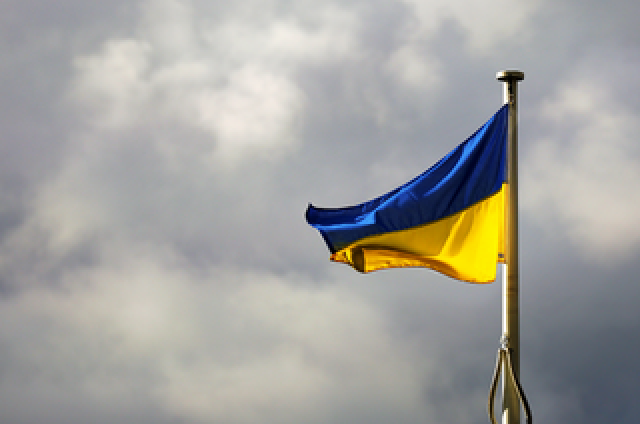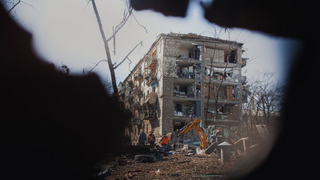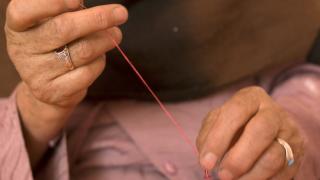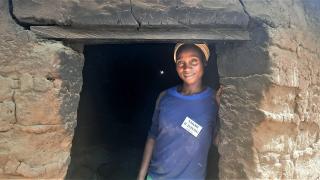Music, Friendship and Sorrow: Twelve Months as a Refugee from Ukraine
Olga turns on the radio for the first time in twelve months. She hasn’t been able to listen to music since Russia invaded Ukraine last year.
In Mariupol, Olga sang pop and folk music with her group, Melody, who made it onto Ukrainian X-Factor and her husband was the Head of Mariupol’s orchestra. When war broke out, Olga made the perilous journey across the border to Poland with her son, Max, and her parents. Her husband stayed behind in Ukraine.
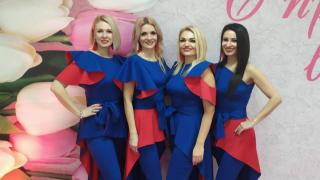
One year later, listening to songs alone in her Warsaw flat, Olga reflects on her past as a musician. “It’s the most important thing in my life and I miss it very much. My singing and my group and all this life, it's very painful for me,” she says.
It isn’t just music that Olga misses. It’s food. Herring in Polish shops is prepared differently, Salo – a Ukrainian delicacy that’s a little like bacon – and the sour beetroot soup she loves, borscht. She misses her friends too. To Olga, Mariupol was a place full of friends and song where everyone knew everyone else. Now, her band, Melody is scattered along with other friends all over the world in Poland, in Germany, in Ireland. There is no sense of “home” for Olga and get-togethers are over Zoom. Scrolling through her phone doesn’t help either, she deleted all her photos on the way to Poland, in case she was captured by the Russians. It’s a decision she now regrets.
Poland has welcomed more Ukrainian refugees than any other country – almost 1.5 million people have registered there, according to the UN, most of them women and children. They are safe, but twelve months after the start of the war, each one remains in limbo, mourning the life they once had.
When I came to Warsaw, I didn’t know how long it would be for and I hoped my husband could join us. Without him, without my parents, we’re not a family. One year has passed and it’s not getting any easier. We know this war isn’t over but nobody knows when it will end. It’s very difficult.
When they first arrived in the city, Olga sent her son Max to the Ukrainian school in Warsaw, but at the beginning of this academic year, he enrolled at a local polish school. A gregarious teenager, he’s happy and has made a lot of friends, reluctantly still studying all his subjects in Ukrainian online at Olga’s insistence.
It’s through Olga's work at a non-profit in Warsaw that she holds on to her life in Ukraine, supporting women like herself who’ve been displaced from Mariupol. The Human Doc Foundation was the first group she encountered when she stumbled across the border. In the weeks that followed, no longer able to sing and desperate to earn money to support herself and Max, Olga volunteered with them until they took her on full-time.
The thing that saves me is my work. I work with people I love. I work with women who talk and hug each other. We support each other.
Women for Women International is fortunate to have partnered with incredible colleagues like Olga at the HumanDoc Foundation to help 320 women and children put the pieces of their lives back together – as much as they can, far from home and family. Together with our partners, we offer dedicated spaces for women refugees to gather and receive psychosocial support, including art therapy, to begin the healing process.
As they grapple with life in a strange city, without their usual support networks, our team provides help finding accommodation, legal counsel and vocational training so women can become financially independent. Just as importantly, in Olga’s view, is the support provided by having a regular coffee with someone who knows exactly what you’ve been through and shares your pain. A vital connection to a life that seems ever further away. Olga says:
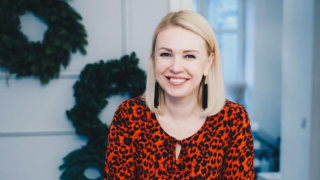
Many women have no one familiar here except their children. When we talk, we understand our problems are the same. It gets easier to feel that you're not alone in this big city.
Despite everything that has happened over the past year, sounds from home still manage to excite Olga. Since she started listening to music again a few weeks ago, she has become particularly enthused about a new wave of Ukrainian pop which has a really fresh sound. Her face lights up as she explains that it has a new, more European style. A year after leaving, it’s music from her home country that’s finally given Olga something to sing about.
About Olga and HumanDoc Foundation:
Olga Moisieieva works with the HumanDoc Foundation, Women for Women International’s partner in Poland. Displaced from Ukraine by the war, she lives in Warsaw with her teenage son. Women for Women International, together with HumanDoc Foundation and the Mariupol Women’s Association, Bereginja help 320 women and children Ukrainian refugees. Together with our partners, we offer dedicated spaces to gather and psychosocial support, including art therapy. Our team provides help finding accommodation, legal counsel and vocational training so women can become financially independent.
Read more stories
Nastasiya
subtitle:
"My name is not Nastasiya. It is too dangerous to tell you my real name." After fleeing the war in Ukraine, 'Nastasiya' says, "We have lost our home, our city and many of our neighbours, but we will not lose our spirit."
Sifa
subtitle:
Motivated by the prospect of learning how to make clothes, Sifa joined the Stronger Women, Stronger Nations programme. But it was the lessons she learnt about women's empowerment that helped to transform her life.
Sarah
subtitle:
The Women for Women International programme was my ray of hope. It felt like I was finally completing my education which was cut short by poverty.

